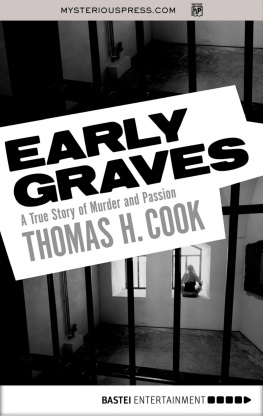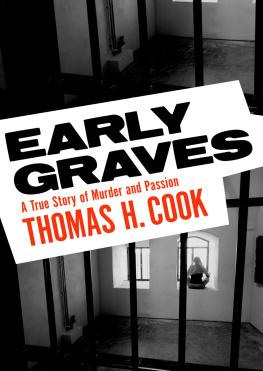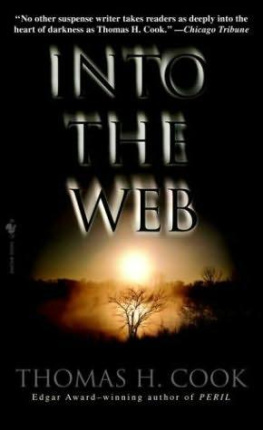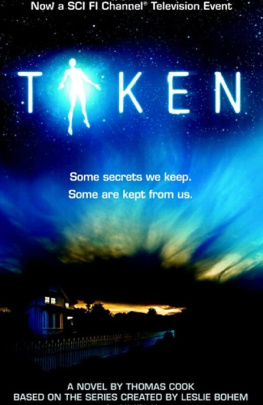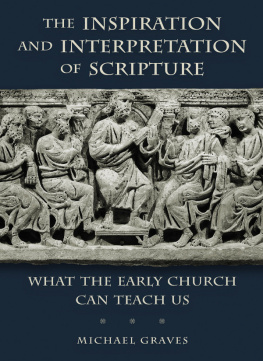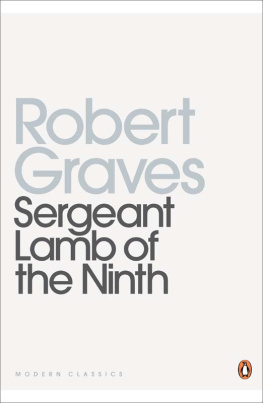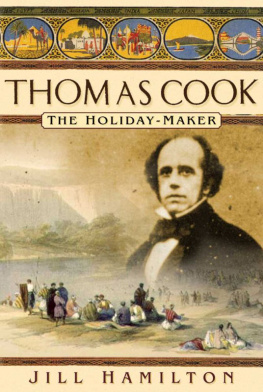Thomas H. Cook - Early Graves
Here you can read online Thomas H. Cook - Early Graves full text of the book (entire story) in english for free. Download pdf and epub, get meaning, cover and reviews about this ebook. year: 2014, publisher: Bastei Entertainment, genre: Detective and thriller. Description of the work, (preface) as well as reviews are available. Best literature library LitArk.com created for fans of good reading and offers a wide selection of genres:
Romance novel
Science fiction
Adventure
Detective
Science
History
Home and family
Prose
Art
Politics
Computer
Non-fiction
Religion
Business
Children
Humor
Choose a favorite category and find really read worthwhile books. Enjoy immersion in the world of imagination, feel the emotions of the characters or learn something new for yourself, make an fascinating discovery.
- Book:Early Graves
- Author:
- Publisher:Bastei Entertainment
- Genre:
- Year:2014
- Rating:3 / 5
- Favourites:Add to favourites
- Your mark:
- 60
- 1
- 2
- 3
- 4
- 5
Early Graves: summary, description and annotation
We offer to read an annotation, description, summary or preface (depends on what the author of the book "Early Graves" wrote himself). If you haven't found the necessary information about the book — write in the comments, we will try to find it.
Early Graves — read online for free the complete book (whole text) full work
Below is the text of the book, divided by pages. System saving the place of the last page read, allows you to conveniently read the book "Early Graves" online for free, without having to search again every time where you left off. Put a bookmark, and you can go to the page where you finished reading at any time.
Font size:
Interval:
Bookmark:

For Timothy Seldes and Miriam Altshuler
Love, Honor, and Obey
and for
Kenneth Kines, and his son, Seth
Acknowledgments
Early Graves could not have been written without the generous cooperation of a great number of people. At the very beginning of my research, John Siler, Cathy Drake, and Brown Keyes were instrumental in setting up my interviews with Alvin Neelley. But they were only the first of a large number of public officials who selflessly gave of their time. I would particularly like to thank Kenneth Kines, who devoted many hours to assisting me, but also David Burkhalter, Elaine Snow, Mike Jones, Mike Ragland, Lonnie Adcock, and Ralph Bishop, of the Rome Police Department, Jim Carver and Sam House of the Georgia Bureau of Investigation, Linda Adair and Ken Dooley of the Rome Youth Development Center, Craig Fowler of the Georgia Department of Family and Children Services, Sue Hitchcock of the Open Door Home, District Attorney Ralph Van Pelt and Investigator John Bass of the Chattooga County District Attorneys Office, Linda allen of the Macon Youth Development Center, Harold Richards, Gary Wright, Cecil Reed, Jackie Tanner, and Charles Houston of the Dekalb County Sheriffs Department, District Attorney Richard Igou, Assistant District Attorney Michael ODell, and Investigators Danny Smith and Darrell Collins of the Dekalb County District Attorneys Office, Court Bailiff Mary MacPherson, and Jimmy Lindsey and the staff of the Dekalb County Clerks Office, Judge Randall Cole and his assistant, Lisa Hall, John Kilbourn and Rodger Morisson of the Alabama Crime Laboratory, and Joe Blackwell and Wade Hill of the Fort Payne Fire Department.
In addition to these public officials, many private citizens assisted me in my investigation. Of particular importance were John and Donna Hancock, Debbie Kines, Fay Freeman, Dennis Benefield, Claire and Dallas Dougherty, Lillian Ritter, Virgil Cook, Dr. Jean Jones and Dr. John Steiner of the Ethel Harpst Home, Britt Miller, Ben Farrington, and George Westmoreland.
Two other people deserve special mention. Mickie Strickland gave invaluable assistance both as a research assistant and as a sounding board for ideas about the case. Hers was a steadily helpful presence in the writing of this book. I cannot thank her enough. And last, it should be noted that my mother, Mickie Cook, continued over a period of many years to remind me of the case. Once I began to work on it, she assisted me in a number of critical ways. This book could not have been written without her care and attention, and for that I offer her my most profound appreciation.
A Note on the Book
During the many months of research into the lives and crimes of Alvin and Judith Neelley, I had occasion to interview scores of individuals. Differing accounts of certain events inevitably emerged. When accounts have been in conflict, I have presented the ones that seemed to me the most plausible from my own knowledge of the people and events connected to the case. In addition, police summations of lengthy and often repetitious interrogations are notoriously condensed, hours of testimony reduced to a few short pages. In recounting such interrogations, I have tried to use the actual language of the participants on those occasions when it has been available to me, as in tape recordings, for example. Otherwise, I have attempted to recreate the actual nature of the interrogation as it has been described to me by people who were actually present. In other cases, I have combined numerous interrogations into one so as to avoid repetition and for the benefit of the narrative form. Courtroom testimony rivals police interrogations for repetitiousness and the accumulation of irrelevant detail. Wherever possible, I have edited courtroom presentations, whether as witness testimony or attorney arguments, in such a way as to preserve both the trials relevant information and its undeniably dramatic tone.
The Convergence of the Twain
H E WAS BORN on July 15, 1953, in Trion, Georgia, a small village in the mountainous northwestern corner of the state, a region of pine forests and green wooded slopes that seem to swirl one around the other. He was the youngest of three children, and there was something so cute about him that his older brother and sister petted him continually, laughing and joking with him as they played games in the yard of their small, white-shingled house. From the very beginning, charm was his forte. He was a jokester, a prankster. All his life, he had a smiling face.
She was born on June 7, 1964, in Murfreesboro, Tennessee, a dingy little town of seedy trailer parks and honky-tonks about ninety miles south of Nashville, just near enough to give off a sense of drying up and turning brown under the heady lights of the Country Music Capital. Local iconography consisted of Jesus nailed to the cross or Elvis painted on velvet. There were plenty of twanging guitars, but they were played by country-music has-beens or never-weres in the steamy red-neck bars. It was an easy town to make jokes about, and as she would later discover, he had a million of them.
Everyone thought he was great, particularly his mother. It was that smile of his. When he flashed it, his whole face lit up. There was just something about him, the watery blue eyes and pink, roly-poly body, that made everyone grin.
All the kids in the neighborhood loved to play with him. One day they even played a little golf when the kids next door brought out their fathers putters and knocked the balls around. There were hills to climb and swimming holes and creeks to swim in. It was a great childhood, filled with days of hunting and fishing and hanging out with the other Boy Scouts in Troop 101. He learned to say the Pledge of Allegiance, to honor God and country, to build a fire, to tie knots. His childhood was a festival of joy. He would never complain about a single day of it.
Her mother worked as a housewife, her father as a construction worker and carpenter. She saw her mother all the time, but her father was often busy, so that she did not see him as often as she would have liked.
She had a sister, Dottie, and a brother, James, whom everyone called Jimbo. They were both older than she. And then there were Bill and Davey, her two younger brothers.
They lived in the section of Murfreesboro known as Walter Hill. They had a garden and trees to climb. They were not rich, but they were not poor either, and none of the children ever lacked for food and clothing. It was not a bad childhood. She would never claim that she had been deprived.
His first school was Fort McHenry Elementary, and from the very beginning he was the class clown. He loved to tell jokes and rib the teachers. And once, when one of them asked him a question he couldnt answer, he broke the other kids up when he told her that if hed already known the answer, he wouldnt have been in school in the first place.
It was the girls he liked to rib the most, and often, during recess, hed go down to the pond and bring back a few baby frogs to scare them with. Theyd scream wildly when he came up suddenly and stuck one of the frogs in their faces. It made him laugh and laugh.
Like all the other children in her neighborhood, she attended the Walter Hill School from 8:30 to 2:45, then played throughout the remainder of the afternoon. It might have gone on like that forever. It was even getting better for a while. Her father had started his own construction company in 1973. He was making good money, between two hundred fifty and three hundred dollars a week. Sometimes he drank a little, and most of the time he seemed far away, but he never said harsh things or lifted his hand against her. The drinking didnt really matter, she loved him anyway.
Font size:
Interval:
Bookmark:
Similar books «Early Graves»
Look at similar books to Early Graves. We have selected literature similar in name and meaning in the hope of providing readers with more options to find new, interesting, not yet read works.
Discussion, reviews of the book Early Graves and just readers' own opinions. Leave your comments, write what you think about the work, its meaning or the main characters. Specify what exactly you liked and what you didn't like, and why you think so.

